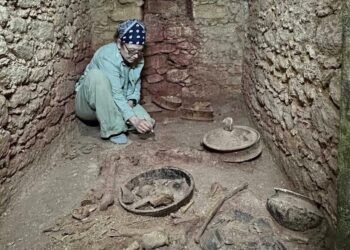Recent archaeological excavations at Vindolanda, a Roman garrison site located south of Hadrian’s Wall in Northumberland, have unveiled compelling evidence suggesting that bedbugs were introduced to Britain by the Romans.

Led by Dr. Andrew Birley, the Vindolanda archaeological team made this rare find, shedding light on ancient hygiene practices and their unintended consequences.
Katie Wyse Jackson, a 24-year-old graduate student from University College Dublin, unearthed two thoraces believed to be from the common bedbug, Cimex lectularius, dating back to around CE 100. This discovery challenges the notion of Roman cleanliness, as the Romans are historically perceived as exceptionally hygienic. Wyse Jackson’s findings are detailed in her research on archaeoentomology.
Dr. Stephen Davis, a lecturer specializing in environmental archaeology at UCD, noted that while bedbugs have been mentioned in ancient Greek writings as early as 400 BCE, finding them in archaeological contexts is exceedingly rare. The Vindolanda bedbugs represent the earliest known instances of their presence in Britain, predating previous discoveries in Alcester, Warwickshire.

Wyse Jackson’s analysis of soil samples also revealed the presence of beetles, providing additional information about ancient trade, food storage, hygiene practices, and waste disposal systems. These findings highlight the coexistence of humans with synanthropic insects, which thrive in close proximity to human activity.
Wyse Jackson remarked, “Finding this kind of thing helps humanize the people of the past.” She highlighted ancient beliefs about the medicinal properties of bedbugs, as noted by Roman philosopher Pliny, who mentioned their use in treating ailments like ear infections.
The discovery of bedbugs at Vindolanda raises questions about the mechanisms by which these pests were introduced to Britain. One theory posits that they arrived with Roman settlers, possibly hitchhiking on straw mattresses or other goods transported during the Roman invasion of Britain in CE 43.
While the Romans are renowned for their engineering feats and advanced sanitation practices, the presence of bedbugs underscores the complexities of ancient hygiene and the challenges of pest control.























